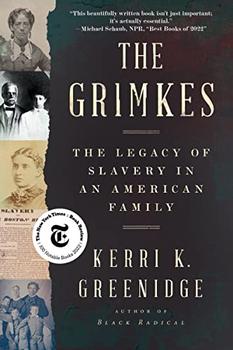Summary | Excerpt | Reviews | Beyond the Book | Readalikes | Genres & Themes | Author Bio

The Legacy of Slavery in an American Family
by Kerri K. Greenidge
The tragedy of the Grimke sisters' lives was the fact that they never acknowledged their complicity in the slave system they so eloquently spoke against. They responded to their Black nephews in the same way that many well-intentioned, yet racially condescending white reformers responded to Black people once they were no longer objects of noblesse oblige but, rather, legally free and autonomous human beings with feelings, thoughts, and ideas wholly independent of white benevolence. When their Black nephews did not adhere to their image of the kneeling and eternally grateful slave, the Grimke sisters were alternately cruel and relentlessly judgmental. The Grimkes, finally, is the story of the limits of interracial alliances when it comes to the eradication of deeply entrenched white supremacist violence and policy. If interracial sexual relationships between white men and Black women were the key to racial reform, or if the acceptance of multiracial Black children within white families were a sign of racial progress, then the Grimkes and the class of equally prominent multiracial families to which they belonged would have signaled an end to segregation, discrimination, and disenfranchisement rather than the retrenchment of these inequalities at the very moment—the turn of the twentieth century—when the Black Grimkes were most prominent.
In our own time, during the first decades of the twenty-first century, America's Black elite exists in a world remarkably like the early twentieth-century Progressive era in which the Black Grimkes lived. Like the revolutionary promise of Civil War and Reconstruction, the potential for racial and economic justice wrought by the Civil Rights Movement of the 1960s and 1970s has been overtaken by continued anti-Black racial violence, political disenfranchisement, and socioeconomic inequality that undergirds so much of late-stage American capitalism. The Grimkes is thus a family biography that resonates in the lives of those who struggle with the personal and political consequences of raising children and families in the aftermath of twenty-first-century betrayal of the radical human rights promise of the 1960s. Much like Archibald Grimke, Francis J. Grimke, and Charlotte Forten Grimke (Francis's wife and a formidable activist in her own right), who lived through and helped shape radical abolition, slavery's violent collapse, and the egalitarian promises of Radical Reconstruction, Americans who lived through the racial and social upheavals of the modern civil rights, women's rights, and antiwar movements of the 1960s have raised children and grandchildren in a world that forgets the lessons of the recent past in favor of neoliberalism, neofascism, and the growth of racial inequality. For twenty-first-century African Americans in particular, who live at a time when middle-class incomes, educational attainment, and material acquisition are no guarantee of future economic and personal stability, the Grimke family story dissects the historical roots and traumatic effects of a Talented Tenth anxious about its future sustainability. If collective racial trauma beleaguers the Black elite today as it did the colored elite during the Grimkes' time, then what does Black "success" look like in the face of continued racial inequity alongside psychic and community despair?
Notes
INTRODUCTIONS: THE TWO NANAS
1. "Twelve Lives Crushed Out as Express Leaps Viaduct," Boston Herald, July 12, 1911, 1.
2. "Twelve Killed and 44 Others Dead in Crash," Springfield Union, July 12, 1911, 1.
3. A. W. Grimke to Archibald Grimke, Boston, MA, December 20, 1911, Archibald H. Grimke Personal Papers, Series B, Box 39-1, Archibald H. Grimke Papers, Moorland-Spingarn Research Center, Howard University, Washington, DC (hereafter Archibald Grimke Papers).
4. W. E. B. Du Bois, "The Talented Tenth," in The Negro Problem, ed. Booker T. Washington (New York: James Pott, 1903), 33.
Reprinted from The Grimkes: The Legacy of Slavery in an American Family by Kerri K. Greenidge. Copyright © 2022 by Kerri K. Greenidge. Used with permission of the publisher, Liveright Publishing Corporation, a division of W. W. Norton & Company, Inc. All rights reserved.
Your guide toexceptional books
BookBrowse seeks out and recommends the best in contemporary fiction and nonfiction—books that not only engage and entertain but also deepen our understanding of ourselves and the world around us.